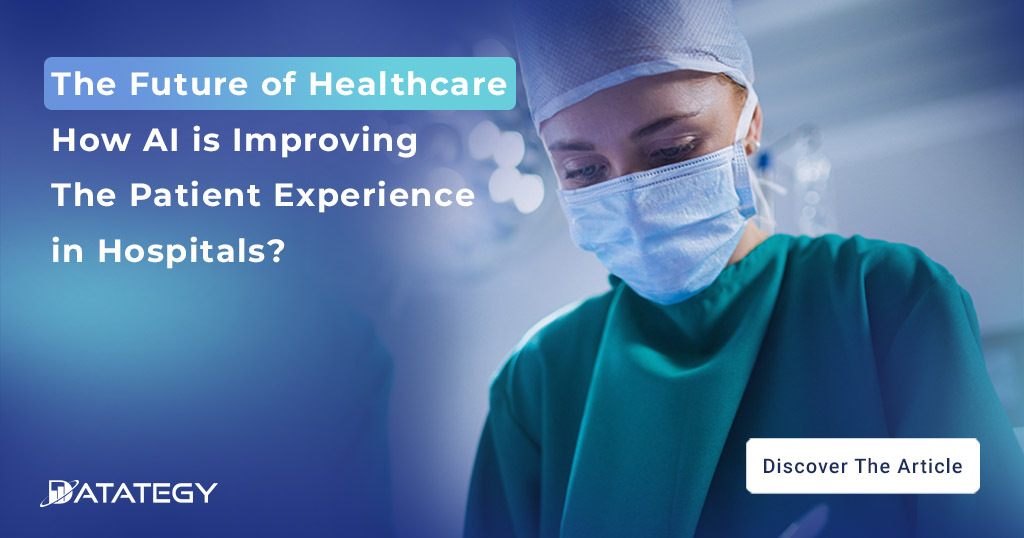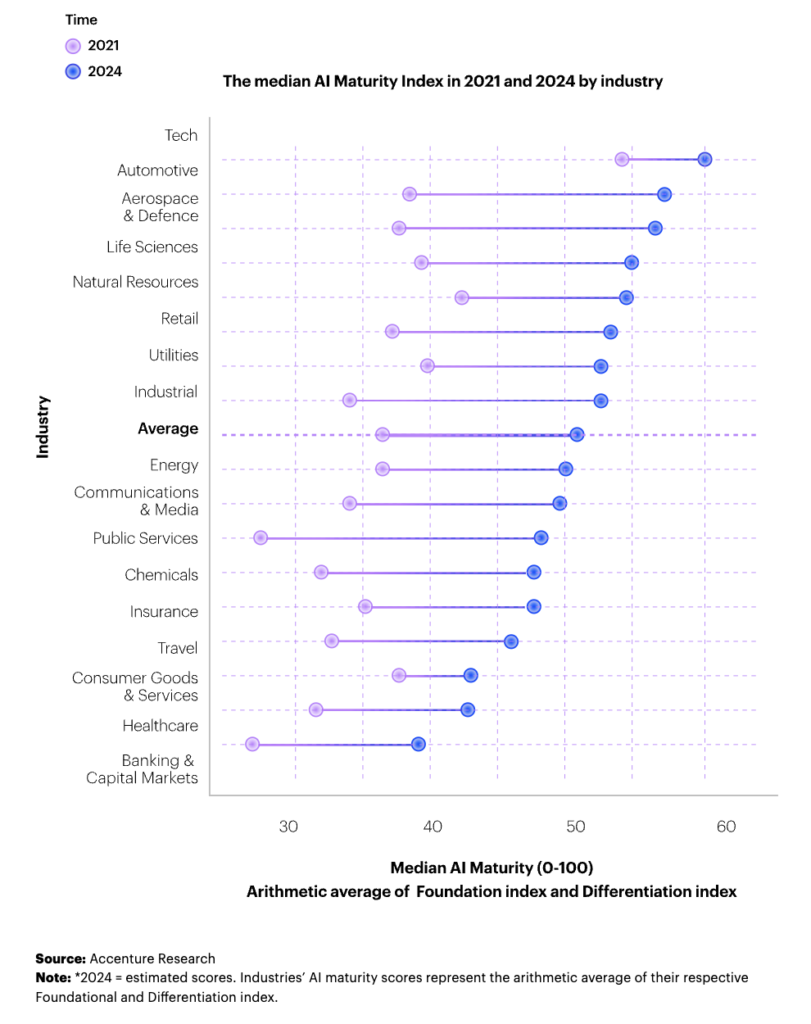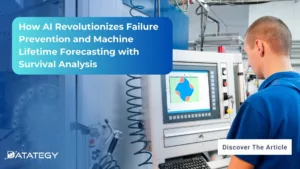Transform Defense Logs & Rapport into Situational Awareness with AI...
Read MoreThe Future of Healthcare: How AI is Improving the Patient Experience in Hospitals?
Table of Contents
ToggleA technological revolution is taking place in the healthcare sector, which is changing how patients are treated. The use of artificial intelligence (AI) in hospitals and other healthcare settings has been one of the most important recent developments. By increasing the precision of diagnoses, enhancing patient engagement, and boosting the effectiveness of healthcare delivery, AI technology has the potential to totally change the patient experience.

A survey by Optum found that 92% of healthcare executives believe that AI will have a significant impact on their industry over the next five years. Additionally, 88% of executives believe that AI will help their organizations achieve better clinical outcomes, and 84% believe that AI will help reduce costs. This article will examine the future of healthcare and how AI is enhancing the patient experience in this environment. We’ll look at the most recent breakthroughs and uses of AI in healthcare, their advantages, and the difficulties associated with putting them into practice.
AI maturity in Healthcare sector
AI maturity measures the degree to which organizations have mastered AI-related capabilities, in the right combination, to achieve high performance for customers, or employees.In our case we are talking about patients and hospital staff. Although artificial intelligence (AI) has a lot of potential in the healthcare sector, it is currently at a very early stage of development. Despite the rising interest in AI, many healthcare institutions have not yet adopted the technology to its full potential, citing a number of justifications.
The complexity of the healthcare sector is one factor contributing to the low degree of AI development there. Using AI solutions in the highly regulated field of healthcare requires careful consideration of a number of legal and ethical issues. Moreover, a wide variety of stakeholders, including users, providers, consumers, and regulators, who may all have different objectives and concerns, make up the healthcare sector.
The difficulty of integrating AI into current healthcare systems is another factor contributing to the low degree of AI maturity in healthcare. It can be challenging to integrate new technologies and communicate data across many departments and stakeholders in the healthcare industry since these companies often rely on a patchwork of outdated systems and walled data sources.
A last barrier to acceptance is the high cost of implementing AI technologies, especially for smaller healthcare companies with tight resources. Long-term efficiency gains and cost savings from AI are possible, but there might be large up-front expenses associated with putting AI systems in place and training people.
According to the latest Accenture report, the healthcare sector is still far behind industries such as tech or automotive in terms of AI adoption maturity.

AI applications currently being used in healthcare
With innovative methods to detect illnesses, create individualized treatment plans, and manage patient data, artificial intelligence (AI) applications have the potential to change healthcare. There are several AI applications being employed in the healthcare industry right now, each with its own specific set of advantages and difficulties, ranging from natural language processing to predictive analytics.
1- Early Detection and Diagnosis
Early illness identification and diagnosis is one of the most exciting uses of AI in healthcare. In order to find patterns and abnormalities that could be symptomatic of the disease, AI algorithms can evaluate vast volumes of patient data, including medical imaging, test findings, and electronic health records. AI can assist physicians in identifying illnesses sooner before symptoms emerge or the condition has advanced too far.
For illnesses like cancer, where early intervention may significantly improve patient outcomes and enhance the likelihood of recovery, early identification and diagnosis are especially crucial. Artificial intelligence (AI)-powered technologies, such as computer-aided detection (CAD) and computer-aided diagnosis (CADx), may examine medical pictures to find anomalies that pathologists or radiologists might overlook. In certain instances, it has been demonstrated that AI algorithms are even more accurate than human specialists at diagnosing specific cancer kinds.
2- Predictive Analytics
Artificial intelligence (AI) algorithms can find patterns and insights that might assist healthcare practitioners in anticipating potential health problems by evaluating patient data, including medical histories, genetic information, lifestyle factors, and social determinants of health.
Predictive models driven by AI, for example, can identify patients who are at a high risk of acquiring illnesses like diabetes or heart disease. This enables physicians to take proactive steps to treat or prevent these conditions before they worsen. This might involve modifying medication dosages to control risk factors or using lifestyle treatments like dietary and activity improvements.
By enhancing precision medicine, predictive analytics can also enhance patient care. AI algorithms can predict patients who are likely to respond favorably to some treatments or who may react negatively to others by examining patient data and genetic information. This can assist medical professionals in creating appropriate care regimens that are catered to each patient’s needs, enhancing treatment effectiveness and lowering the possibility of problems.
3- Improved Patient Care
AI has the potential to transform patient care by empowering medical professionals to give more personalized and successful treatments. AI algorithms can find patterns and insights that can assist physicians in customise treatments to specific patient requirements by evaluating patient data, including electronic health records, medical imaging, and genetic information.
To enhance patient safety, physicians can change doses or suggest alternative treatments by using AI to identify patients who are at risk of problems or bad medication responses. By giving healthcare professionals immediate access to the most recent insights in medical research and clinical recommendations, AI-powered clinical decision support technologies can also assist them in making diagnosis and treatment choices that are more precise. AI can also enhance patient care by supporting telemedicine and remote monitoring. Clinicians may monitor patients outside of the hospital or clinic environment by utilizing wearable technology and mobile apps, offering early intervention and assistance to avert problems and manage chronic illnesses. Platforms for telemedicine also make it possible for patients to obtain medical attention and consultations from distant areas, expanding access to treatment and lightening the load on medical professionals.
4- Enhanced Medical Imaging
From cancer and heart disease to muscle spasms and neurological conditions, medical imaging is an essential tool for the diagnosis and treatment of a wide range of medical illnesses. However, it may be difficult and requires specific knowledge and lengthy training to evaluate medical pictures. AI has the potential to increase the efficiency and accuracy of medical imaging by enabling automated picture processing and abnormality detection. Large volumes of imaging data may be analyzed by AI algorithms to find patterns and insights that might aid medical professionals in developing more precise diagnoses and efficient treatment strategies.
AI, for illustration, can assist in spotting early indicators of cancer or other disorders in medical imaging, enabling healthcare professionals to act sooner and administer focused therapies to enhance patient outcomes. By giving more thorough and precise information about a patient’s condition, AI-powered medical imaging can also assist decrease the necessity for invasive treatments like biopsies or exploratory surgery.
5- Streamlined Workflow
AI can help healthcare practitioners save time and lessen administrative stress by automating chores like appointment scheduling, data input, and record-keeping, giving up more time to focus on patient care.
The requirement for human appointment scheduling and triage can be reduced, for instance, by using AI-powered chatbots to assist patients in booking appointments and offer rudimentary medical information and advice. Healthcare practitioners may take notes and retain records with the use of AI-powered speech recognition and natural language processing technologies, freeing them up to concentrate more on patient contacts and less on administrative work.
AI can assist healthcare professionals with capacity planning and resource allocation, allowing them to streamline their processes and guarantee that patients are receiving the best treatment possible. AI algorithms, for instance, may assist medical professionals in forecasting patient demand for certain services and adjusting staffing levels appropriately, ensuring that patients receive prompt and efficient care.
6- Reduced Medical Mistakes
One in ten patients worldwide experiences medical mistakes, according to World Health Organization research. By giving healthcare professionals decision-support tools and automating drug management procedures, AI can assist lower medication mistakes.
By evaluating patient data and prescription records, AI can assist healthcare professionals in identifying potential drug combinations and allergic responses, lowering the chance of medication mistakes. By examining patient data and finding trends and insights that might guide treatment choices, AI can also assist healthcare practitioners in creating more individualized treatment regimens.
Moreover, AI can support surgical procedures by giving doctors real-time, high-resolution pictures and data to direct their actions and lower the possibility of surgical mistakes. Artificial intelligence-enabled surgical robots can also support sensitive operations and aid medical professionals in achieving more precise and accurate surgical results.
Conclusion
In conclusion, by enhancing patient care, optimizing workflows, and lowering medical mistakes, AI has the potential to revolutionize healthcare. AI-powered technologies are already having a big influence on the healthcare sector, from early detection and diagnosis to improved medical imaging and predictive analytics.
Consider scheduling a demo with papAI solution if you’re interested in developing your own AI-based healthcare tool. The Hospital Centre Chalon sur Saône utilized this technology to develop a severity index, proving its usefulness in healthcare applications.
It’s obvious that AI will play a bigger part in improving patient outcomes and providing better, more individualized treatment as healthcare continues to change. Healthcare providers may remain ahead of the curve and give the best treatment to their patients by embracing AI-powered technologies.
Interested in discovering papAI?
Our commercial team is at your disposal for any questions.
Why AIOps Is Key to Cyber Threat Detection in Defense?
Why AIOps Is Key to Cyber Threat Detection in Defense?...
Read MoreHow AI Transforms Predictive Maintenance in Defense Equipment
How AI Transforms Predictive Maintenance in Defense Equipment In a...
Read MoreHow to Scale AI Without Breaking Your Infrastructure in 2025
How to Scale AI Without Breaking Your Infrastructure in 2025...
Read More


